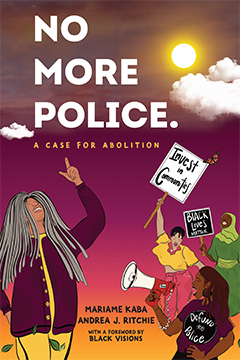The Black Lives Matter movement, reinvigorated during the summer 2020 uprisings, galvanized hundreds of thousands of people into the streets and ushered the slogan “defund the police” into wide circulation. But over the past two years, as targeted communities and abolitionist organizers have proposed radical, imaginative alternatives to the violence of policing, “defund” has been shouted down in many places, in favor of minimal efforts toward police reform. This year, the NYPD budget alone is set to increase by $90 million while 77 percent of NYC public schools face budget cuts. Clearly, the conversation on where and why we direct public funds is as relevant as ever.
No More Police: A Case for Abolition by Mariame Kaba and Andrea J. Ritchie offers a timely reintroduction to the abolition movement, harnessing its passion into actionable steps that empower us to pick up the mantle of creating a future that serves our communities.
“Unpack the Notion of Safety Itself”
Among the first steps is “Reclaiming Safety,” as excerpted in
Inquest. With a brilliant mix of compassion and logic, Kaba and Ritchie challenge readers to extricate their own definition of safety from the state’s current police-dependent one. As they write, “the state’s carceral safety robs our communities of the conditions and nutrients that would allow true safety to grow, forcing us into the position of constantly reaching for more security from the very institutions that make us collectively less safe.” To reject the paradox of state-defined safety, they encourage readers to think about when they themselves feel safe, what contributes to this feeling, and what institutional and personal factors can further nurture this feeling. These are the factors that we as a society should be investing in, taking “money away from death and [putting] it toward life,” as Ritchie said in an interview with
The Guardian.
Acknowledge Reformism As the Problem, Not the Solution
But shouldn’t we attempt to reform the system to better serve us now, while continuing our pursuit of abolition as a long-term goal? This commonly asked question came up on
The Takeaway’s episode
Deep Dive: Police Abolition, on which Andrea J. Ritchie was featured as an “abolitionist teacher.” Other guests argued for the importance of shoring up the police force with further training and better pay as a final or interim solution. But these solutions, and in fact the question itself, convey an inability to imagine a world without police. Taking to
Twitter to respond to other guests, Ritchie states that “the bridge to the future we want lies in where we invest resources now, not in continuing to shackle our imaginations to the violence of policing or the failed idea that we can somehow contain it.” She and Kaba argue in “Why We Don’t Say ‘Reform the Police,’” an excerpt published in
The Nation, that policing in the United States, with its violent and racist origins, is unreformable. From the 1994 Crime Bill to Obama’s 2014 Task Force on 21st Century Policing, the funds that poured into reforming the police have historically had extremely limited impact on policing. The issue is not a lack of resources, it is assuming that an antiquated system built to oppress a portion of the population is of use.
Create Attitudes of Abundance
Ritchie and Kaba call instead for the reallocation of resources into a modern form of the commons, to be used for “collective sustenance and celebration.” “Reimagining the commons” allows individuals to use their definitions of safety as guidelines when reinvesting resources to best suit their community, as Ritchie and Kaba expand upon in an excerpt in
Truthout. The authors invite us to envision “de-commodified access to things that make life worth living,” from universal health care to access to arts and cultural events. While the current system polices who deserves access to such resources, Ritchie and Kaba argue that shifting to a perception of abundance rather than one of exclusion will enable communities to thrive. Realizing the ideal of the self-governed community is only possible when you trust the people to determine the best use of resources for themselves through the experimentation and implementation of individualized safety measures.
While the media and bandwagon politicians may have moved on from “defund the police”—in no small part aided by the “copaganda” Kaba and Ritchie describe in their
Guardian interview—
No More Police outlines a pathway back to and beyond this slogan. It is simultaneously a call to action and to compassion, and a road map on how to get there. As the United States continues to be a leader in law enforcement violence, with incidents of police brutality making national headlines multiple times a week,
No More Police and its accompanying
Reading and Discussion Guide show activists how to turn what conservatives and liberals alike consider an impossibility into our reality.
* * *
This post was written by Maya Petrillo-Fernandez, a Fall 2022 New Press intern.

